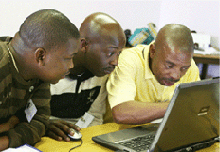Developing our emerging markets
By sharing best practice across Pearson, we can be more effective in our actions as a good corporate citizen in our developing markets. The continuing growth and consolidation of our businesses in India, Africa, Latin America and Asia offers a unique opportunity to implement the internal infrastructure and external relationships inherent to a healthy business relationship with the local community. Penguin India, for example, is forming an association with other companies in the community in Panchsheel to lobby government bodies to resolve issues such as poor parking facilities, faulty drainage and generators adding to the pollution and health and safety concerns in the area. The formation of Pearson Southern Africa – bringing together our education businesses in the region – means our company is now active in 12 developing countries in the area and employs, trains and develops local staff in each. By underpinning our educational and commercial imperative with respect for the African environment, we can use our position as market leader to promote education in local cultures and languages to maintain a sustainable, socially responsible business.
Snapshots from 2009
Pearson Professional Development Program
The Pearson Professional Development Program, launched in 2008, has produced a three-pronged program of teacher training in best practice, focusing on literacy, numeracy, early childhood development and technology in 2009. This partnership between Pearson Southern Africa and the Pearson Foundation has resulted in ‘how-to’ videos to enable teachers in South Africa, Kenya and Nigeria to facilitate their own professional development initiatives in their schools for colleagues.


Penguin India has taken a number of freight initiatives which have saved a significant amount of fuel expenditure, increasing the number of books printed in India on behalf of Penguin UK, Penguin USA, Sterling and Bloomsbury to avoid the carbon emissions from moving 95 tonnes of books from the UK/USA to India.
Ladybird is working with Pearson’s New and Emerging Technologies team on the trial of a mobile phone initiative. Paired with Mobile Xcetera, Ladybird is exploring how to deliver material digitally via mobile devices, seeking to use the Key Words Reading Scheme to deliver content to mobile users in Nigeria, especially schoolchildren aged 5+ learning English. Twelve schools in Lagos were involved in the initial trial in 2009, and the initiative will be launched across the rest of the country from 2010.
A few words from: Fathima Dada

“Our approach to business is always developmental: we have local staff, offices and infrastructure in all of our markets and regions and invest in their improvement.”
CEO, Pearson Southern Africa
We publish in over 50 languages in Africa, ensuring that children have the opportunity to learn in their mother tongues. In almost all schools across the regions in which we work, one in two books on every desk is a Pearson book.
Our approach to business is always developmental: we have local staff, offices and infrastructure in all of our markets and regions and invest in their improvement. We have partnered with the Angolan government to ensure that their six indigenous languages are saved from extinction and that Angolan children can read stories in their own languages for the first time. We run thousands of support and training workshops for teachers every year through our businesses in 11 countries from South Africa to Kenya.
We really do believe that we should put something back into the communities in which we work. The Maskew Miller Longman and Pearson Foundations have over the past two years achieved incredible wins in education development work in marginalised and poor communities: we’ve run gender workshops for 400 girls, digital arts programmes for 600 secondary school students, school interventions and improvement programmes for 16 of the poorest schools in rural areas, sponsored three masters education students in partnership with local universities, and exposed 240 families to shared-reading methodologies at our family book nights.
Fast fact:
Pearson headquarters’ recycling scheme
In 2009, the whole Pearson headquarters building at 80 Strand, including the floors used by our external tenants, turned to a more environmentally robust recycling scheme. All rubbish is now separated by using communal waste bins for paper, recyclable material, wet waste/non-recyclable material and organic waste. Composting bins are collected by a company called Juniper, which then produces compost for farmers in Kent, UK. This scheme is now in place throughout all Pearson buildings in the UK, with various composting companies.
